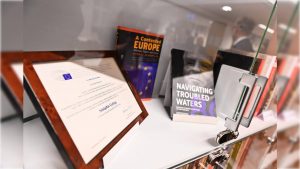Pier Paolo Pigozzi, a law scholar, was ready to join the John Lukacs Research Institute, but starting from February 1, he found himself in the top leadership of the university as the new Vice-Rector for International Affairs at the National University of Public Service (Ludovika). In our interview with him, we discussed his leadership appointment, the creation of university community, his plans as vice-rector, and the essential qualities he believes future public servants should possess.
Can you recall your first memories related to Hungary? For example, when did you first come across the name of the country?
On the one hand, the answer is easy: my first significant encounter with Hungary was in 2015 when I met my wife. On the other hand, if I delve a bit deeper into the response, I should go back to 2012. At that time, I attended a comparative constitutional law course, focusing on comparing the jurisprudence of the German Constitutional Court with that of the United States Supreme Court. Professor Donald Kommers, and authority in the field, frequently referred to Hungarian jurisprudence to illustrate the most significant constitutional global trends. So, that was the first time I not only encountered but also seriously engaged with the Hungarian legal culture– beyond the geography lessons in high school.
How did you decide to join the university? Please recall how you received the invitation to take on the position of international vice-rector!
It all started with Bernát Török, the director of the József Eötvös Research Center of Ludovika. Initially, he was looking for comparative and international law researchers for the newly forming John Lukacs Research Institute. I began the admission interviews with him, and as my application progressed, Bernát generously forwarded my CV for consideration as a possible new international vice-rector. And here we are now.
What was the most important motivation for you when you accepted the university’s invitation?
I have been involved in academic life since 2008, starting as an instructor and then continuing as a researcher and professor in various capacities. As a member of the university community, I always had the desire to figure out how we could do our job differently and better. I mean, not just serving the prescribed statistical requirements, not only meeting accreditation and scientific metric criteria, but also making the university a real community, a community of friendship and knowledge. I’m very excited to have the opportunity now, in a leadership position, to serve the values, thoughts, and ideas I believe in, which, in my opinion, can make university life even better.
What are your first impressions of the university? Do you see the spark of this improved university community, the possibility?
Even from the outside, before knowing what to expect, it was evident that this is a university engaged with cutting-edge questions and with a very active academic life. This impression has strengthened day by day during the past weeks through daily encounters. I sense that a fantastic community has formed here at Ludovika, with very interesting research and educational projects, and various programs possible only through the joint participation of the university’s four prestigious faculties. I am getting to know supportive colleagues who are well acquainted with each other, in constant communication, always aware of each other’s work. They collaborate, exchange ideas, and support each other in everything. I am gradually getting to know professors who simultaneously lead significant projects and participate in other outstanding projects – always supporting each other. In short, my first impression of how university life unfolds in this community, which welcomed me very warmly, is excellent.
Can you already share what projects you plan as the vice-rector for development at the university? Or how do you intend to shape your program based on a quote or motto?
No, there is no such motto or slogan yet, and I don’t want to rush into that. First, I want to hear and understand exactly what our faculty is already doing well, what international partners they already collaborate with at individual or institutional levels. I want to know what their interests are and what they are already strong at on the international stage. Of course, I have my own ideas about internationalization, but it’s important for me to hear from them – not just necessarily in leadership meetings – their thoughts on this matter. The university is already proud of its vibrant international relationships with other universities. My idea is to provide full support to those relationships where collaboration is frequent, potentially lasting for several years, not ending with the completion of a single project. I will work to create programs together that do not exhaust themselves in a single year but serve as a breeding ground for new and shared projects through the dense sharing and discussion of ideas.
Mr. Vice-Rector, what is important for the readers of the university magazine to know about you and your previous activities?
I started my career as a public servant at the Ecuadorian Ministry of Foreign Affairs, then at the UN Refugee Agency, where I had the opportunity to confront the practical aspects of urgent social science tasks. I clerked at the Constitutional Court in Ecuador and more recently I have been a consultant and performed advisory tasks for the European Commission, the USAID program in Paraguay and other goverments and intarnational organizarions. Yet, for the past 15 years, I have been mainly involved in the academic sphere, focusing on the legal and philosophical research on international human rights law and constitutions. Right before coming to Hungary, I was an associate professor of law in Santiago de Chile, and before that I spent more than five years at the University of San Francisco in Quito, Ecuador. During those years I was also invited to lecture at the University of Siena, and Péter Pázmány Catholic University on my research on the Latin American constitutional identity. Based on these experiences, I am open to both abstract and deep discussions, as well as concrete and very practical matters. Additionally, I am an active member of the Olga Wojtyla Society in Chile, which primarily focuses on the Christian tradition of thought and dialogue with contemporary culture. However, if something should define my term as Vice-Rector,: the door to my office is always open to university citizens. I hope, over time, to meet as many students and faculty members as possible here who will share their ideas with me or seek some assistance. I will be happiest when I can support the international project they have conceived, whether institutionally or personally.
Allow me a professional question, which may be important for the students at the university. What do you think will be the most important skills and knowledge for future public servants?
The cultivation of our reasonableness. Last week, at the Ludovika Ambassador Forum, Pál addressed the question of how much regulation would be necessary and sufficient for the citizens of the European Union. He introduced a perspective that I think is crucial for all those working in public service, but it’s also worth considering for every lawyer. He said: of course, we need to establish some fundamental values that must be included in common European legal norms, a value minimum that must be adhered to. But after accomplishing this task, there is ample room for debate and – he used the term – rational compromise. Dean Sonnevend is not only a great Hungarian legal scholar, but he himself knows from first hand the challenges of public administration –as he was legal advisor to President Ferenc Mádl and to President László Sólyom.
There is no technical training or ability that can replace practical reasonableness. And this can only be developed within us through reading philosophy, literature, and various fine arts. The development of our prudence, our reasonableness and human spirit, is a lifelong task. Once again, I emphasize: no technical skill or tool will replace the ability to understand, as human beings what is a reasonable answer when striving for the common good of our nations.
What advice would you give to someone who has just started an academic career at the University?
To persevere in the quest for what is good and beautiful. Time as student goes by very quickly and this is the time in life to explore everything freely. The years at UPS Ludovika offer unparalleled possibilities to become acquainted with the truth-seeking methods of a number of disciplines as well as the chance to encounter of beauty of other cultures through the flesh of fellow students and professors. Students are the main beneficiaries of all that university life has to offer and they should take advantage of every bit of it.
Photo: Dénes Szilágyi


